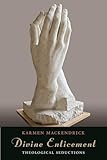Divine Enticement : Theological Seductions / Karmen MacKendrick.
Material type: TextPublisher: New York, NY : Fordham University Press, [2022]Copyright date: ©2013Description: 1 online resource (320 p.)Content type:
TextPublisher: New York, NY : Fordham University Press, [2022]Copyright date: ©2013Description: 1 online resource (320 p.)Content type: - 9780823242900
- 9780823291403
- online - DeGruyter
| Item type | Current library | Call number | URL | Status | Notes | Barcode | |
|---|---|---|---|---|---|---|---|
 eBook
eBook
|
Biblioteca "Angelicum" Pont. Univ. S.Tommaso d'Aquino Nuvola online | online - DeGruyter (Browse shelf(Opens below)) | Online access | Not for loan (Accesso limitato) | Accesso per gli utenti autorizzati / Access for authorized users | (dgr)9780823291403 |
Browsing Biblioteca "Angelicum" Pont. Univ. S.Tommaso d'Aquino shelves, Shelving location: Nuvola online Close shelf browser (Hides shelf browser)

|

|

|

|

|

|

|
||
| online - DeGruyter Derrida Vis-à-vis Lacan : Interweaving Deconstruction and Psychoanalysis / | online - DeGruyter Desperate Clarity : Chronicles of Intellectual Life, 1942 / | online - DeGruyter Difficulties of Ethical Life / | online - DeGruyter Divine Enticement : Theological Seductions / | online - DeGruyter Doing Philosophy Personally : Thinking about Metaphysics, Theism, and Antiblack Racism / | online - DeGruyter Domesticating a Religious Import : The Jesuits and the Inculturation of the Catholic Church in Zimbabwe, 1879-1980 / | online - DeGruyter Ecce Monstrum : Georges Bataille and the Sacrifice of Form / |
Frontmatter -- Contents -- Acknowledgments -- Introduction: From the Presence to the Sign -- 1. Seductive Epistemology: Thinking with Assent -- 2. Reading Rites: Sacraments and the Community of Signs -- 3. Because Being Here Is So Much: Ethics as the Artifice of Attention -- 4. Prayer: Addressing the Name -- 5. Take and Read: Scripture and the Enticement of Meaning -- In Place of a Conclusion: Thoughts on a Prior Possible -- Notes -- Bibliography -- Index
restricted access online access with authorization star
http://purl.org/coar/access_right/c_16ec
Theology usually appears to us to be dogmatic, judgmental, condescending, maybe therapeutic, or perhaps downright fantastical—but seldom enticing. Divine Enticement takes as its starting point that the meanings of theological concepts are not so much logical, truth-valued propositions—affirmative or negative—as they are provocations and evocations. Thus it argues for the seductiveness of both theology and its subject—for, in fact, infinite seduction and enticement as the very sense of theological query. The divine name is one by which we are drawn toward the limits of thought, language, and flesh. The use of language in such conceptualization calls more than it designates. This is not a flaw or a result of vagueness or imprecision in theological language but rather marks the correspondence of such language to its subject: that which, outside of or at the limit of our thought, draws us as an enticement to desire, not least to intellectual desire. Central to the text is the strange semiotics of divine naming, as a call on that for which there cannot be a standard referent. The entanglement of sign and body, not least in interpretations of the Christian incarnation, both grounds and complicates the theological abstractions. A number of traditional notions in Christian theology are reconceived here as enticements, modes of drawing the desires of both body and mind: faith as “thinking with assent”; sacraments as “visible words” read in community; ethics as responsiveness to beauty; prayer as the language of address; scripture as the story of meaning-making. All of these culminate in a sense of a call to and from the purely possible, the open space into which we can be enticed, within which we can be divinely enticing.
Mode of access: Internet via World Wide Web.
In English.
Description based on online resource; title from PDF title page (publisher's Web site, viewed 03. Jan 2023)


